A poet's life
Plato would have banned poets from his Republic, there being no place for liars and seducers, storytellers and social critics. Is a poet's life really so dramatic? We endeavour to find out.
by Andrew Mullins and Patrick McDonagh
If you were to go to a masquerade ball dressed as a poet, how would you disguise yourself? Poets can be the most protean of artists: they can work anywhere, dress in any way, exist under any circumstances. In the 1940s, when people called the Hartford Accident and Indemnity Company and asked to speak to the vice-president, many were unaware the man they were talking to, Wallace Stevens, was one of the most widely read poets of the day. Similarly, you cannot simply identify a poet strolling the grounds of McGill by distinctive markings, as you would a blue jay. But the fact that you can't see them doesn't mean they aren't there.
Despite - or perhaps because of - their day-to-day anonymity, poets have a reputation. In the early nineteenth century, poets such as Samuel Coleridge, William Wordsworth and William Blake propounded a view that poets were divinely inspired, the muse conferring the gift of poetry upon her conduit, the poet. But the poet's life wasn't simply a matter of being seduced by the muse, and seducing others in turn. Poets were also supposed to abandon all to their art and live in privation. If anyone was found frozen in a garret, chances are that it was a poet.
But there was a paradox. According to the stereotype, poets were also supposed to live a life of indulgence, casting aside the fetters of staid morality and exploring sensual and intellectual realms with equal enthusiasm. "Enough! or too much," Blake demanded in The Marriage of Heaven and Hell, setting the stage for such fast-living legends as Welsh bard Dylan Thomas.
Who could live up to such a billing? Not Thomas, whose pursuit of the poetic life left him dead of wild living at 39. Today the poet almost seems a quaint throwback to a time before high-tech action movies and World Wide Web browsers. Whither the poets?
You can't see them, but they're out there somewhere. The League of Canadian Poets lists 450 members, and about 100 titles of poetry were published in Canada last year. There are writers, even if readers are elusive: a bestseller in poetry need only sell 500 copies. Meanwhile, the notion of romantic inspiration has taken a beating. Poets admit the truth - poetry is a craft requiring discipline and knowledge, rather than a gift from the gods. Hard work, little recognition. Then there's that problem of filthy lucre. True, we now have Murray Lachlan Young, a dashing "spoken-word" poet and Scotsman who has the literati proclaiming the apocalypse over his multi-million dollar deals with both the EMI recording company and MTV. But back down on earth, even making a living on trochees and enjambments is a near impossibility, a fact that perhaps drives many poets today to academic life.
McGill has had more than its share of poets over the years. They've wandered the campus greens in a Wordsworthian reverie as their latest sonnet or villanelle took shape, or huddled in their turtlenecks over abundant liquor and endless cigarettes as they debated personal and universal poetics (though these days the young poet's costume might be tattoos and Birkenstocks). Many McGill poets of yesteryear now loom as fixtures of the Canadian canon: F.R. Scott, BCL'27, LLD'67; A.J.M. Smith; A.M. Klein, BA'30; Louis Dudek, BA'39; Leonard Cohen, BA'55, LLD'92; and perhaps most imposing of all, Irving Layton, BSc(Agr)'39, MA'46. Others are just now establishing themselves as poets to be reckoned with: Anne Carson and Eric Ormsby are receiving international recognition, even while most Canadians - never quick to celebrate our best and brightest - ask, "Who?"
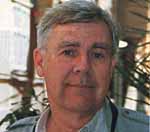 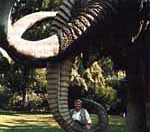
Photos: Irena Murray
December
December rings in the chill mouths of bells,
the shadowy solicitude of grasses
eyelashed with precarious snow.
There is a crystalline insistence in the black
repetitious rooftops with their shock
of snow. The ragged chimneys seem
to pray with fingers pinched
together in entreaty while the luscious
clouds of winter wallow on gray
organzas of sundown.
December bows
under threadbare memories. The spider
in the corner of the house shrivels
to a small dark claw. At night
our dreams infringe and pool,
our common terrors shake us in sleep.
Upriver there are remote
oceans whose cold waves still ring
like freezing echoes in the mouths of bells.
- Eric Ormsby, from Bavarian Shrine and Other Poems, ECW Press, 1990
|
Essential gaudiness and the music of words
Eric Ormsby knows the trials and tribulations of becoming a poet. Ormsby, 55, is a professor of Islamic Studies. His office is stacked high with books, some in English, others in Arabic, that form an extra wall before his desk. Yet Ormsby keeps his academic work and his poetry separate (when he was director of libraries, "No one wanted to see a poetic budget," he notes).
Ormsby has published in such high-profile journals as the New Yorker, the New Republic, Descant and The Fiddlehead. "Writing is a separate part of my daily activity. I used to write in the mornings when I was director of libraries; it was easier to compartmentalize my day then. Being a professor draws a lot of energy. It would be very hard for me to write a poem after teaching. But I still write daily."
If poetry takes only a fraction of Ormsby's working day, the poet's life must look like anyone else's life. Maybe even less exciting, because much of what makes a poet happens internally. "I just like words," says Ormsby. "I like the music of words, something memorable that sticks in the mind." His love of words is apparent - his poems are often best read in the company of a good dictionary: ". . . those peach-stung / volutes of supersession," he writes in "Turtle's Skull," "cowrie / and turkey wing, the murex with its acrid spirals and the bony rose / of the lion's paw." "That may be a flaw," he says, but there is a meaning to this style. "I think poetry needs more razzle-dazzle. What Wallace Stevens called the 'essential gaudiness of poetry,' or Louis MacNeice called a 'controlled flamboyance of diction'."
Ormsby's poems describe the minutiae of life: ant lions and roadside grasses vie for space with memories of home and family. "One draws from one's whole lifetime in writing - experiences are so intense. A lot of my writing coincided with my mother's death and the closing of her home. I'm also drawn by the past, seeing it as something dangerous one has to handle very carefully. It's not a neutral zone. One could become swallowed up by it."
Life as a poet for Ormsby is tentative: "I think of myself as a poet when I'm writing poetry. I might introduce myself as a poet if I were with other poets," he concedes, "but the status is provisional. You never know when you sit down to write if the gift will be present. You have to earn it each time."
Unassuming in person, Ormsby is not inhibited on the page. He has published three collections of poetry - his latest, For a Modest God, with New York's prestigious Grove Press - and in 1991 he won the QSPELL A.M. Klein Prize for poetry. In the world of the poet, he has hit the big time - three of his poems appear in the Norton Anthology of Poetry, which, as a standard undergraduate text, is the nearest thing to a poet's Hall of Fame in North America. Even so, Ormbsy doesn't automatically get his poems published.
"In the past, I would send out 30 to 40 poems for every one accepted, but no longer. Now I send to journals more likely to publish my work.
"You can't write poetry for the acknowledgement, because you won't get it (never mind money!) but for your own satisfaction," he explains. "There's nothing like feeling you've put something down the way you wanted to - I get a real sense of exhilaration."

|
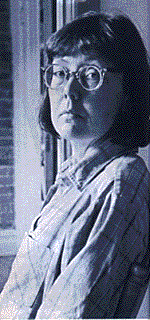
Photos: Uncle Heavy
|
On Ovid
I see him there on a night like this but cool, the moon blowing through black streets. He sups and walks back to his room. The radio is on the floor. Its luminous green dial blares softly. He sits down at the table; people in exile write so many letters. Now Ovid is weeping. Each night about this time he puts on sadness like a garment and goes on writing. In his spare time he is teaching himself the local language (Getic) in order to compose in it an epic poem no one will ever read.
- Anne Carson, "Short
Talks" from Plainwater, Knopf, 1995
|
|
Brainsex, volcanoes, Italian retreats
Is the poet an authentic recluse, sequestered alone at home in the darkness of a too tiny and strangely aromatic apartment, poring over the hieroglyphs and metaphor of the latest manuscript? Emily Dickinson certainly didn't get out much, and the youngest Brontë sister - another poetry-cursed Emily - wasn't exactly jet-setting across the English moors either. Trying to reach a more contemporary poet, Anne Carson, 46, a professor of classics at McGill whose poetry is affected by both these women, had us wondering.
The winner of a prestigious Lannan Literary Award (US$50,000) last year, the 1996 QSPELL Prize for poetry, and a recent recipient of a Rockefeller Foundation grant - awarding her a stay at the Foundation's scholarly and artistic retreat in Bellagio, northern Italy - the prize-laden Carson proved difficult to reach. We received a tip she was back in town ("I think I just saw Anne Carson, coming out of Leacock," said our source, as if she had just spied the elusive American master novelist Thomas Pynchon or a rare warbler). Calls to Carson's office bounced to the history department. Calls to the history department met only with answering machines. E-mail vanished into cyberspace. We briefly considered staking out Carson's office or city block, like poetry-crazed paparazzi, the way Pynchon himself was recently ambushed and photographed after 30 years of improbable anonymity in Manhattan.
Instead we hit the books, something the poets would no doubt prefer. Carson is on the verge of becoming a major poet. She can actually sell poetry (no mean feat), and her poems make you happy for the state of the art. Her work blends long mesmerizing narratives, fragmentary lyrics taking inspiration from her classical background and its world of ancient bits and pieces, distilled prose poems, and essays that metamorphose into poetry themselves. Carson's muse is formally experimental, without alienating the reader. As for interviews, a Q&A section in the long poem "Mimnermos: the Brainsex Paintings" from Carson's Plainwater provides a clue to her feelings about those: "What are you digging for," asks the hoary 7th-century BC poet Mimnermos of the interviewer, whose questions are met with silence.
Still, Carson has been interviewed by Matrix magazine, and McGill's student-published Scrivener. She is well-travelled and many poems take the form of poetic travelogues. She has even worked in television, as a consultant for the PBS documentary series The Nobel Legacy, an experience that did not leave her impressed. "TV is made of light, like shame," she writes in her poem, "TV Men."
The idea of Carson the poet sequestered in an Italian retreat provided by the Rockefellers isn't exactly dull stuff either. Shelley, Byron and others were at home in Italy. Shelley died a poetic death there by drowning in the Bay of Spezia, later to be cremated on the beach where he washed ashore. His friend Edward Trelawny plucked the poet's heart from the fire and gave it to widow Mary Shelley. Over the centuries, Bellagio has seen the likes of Pliny the Younger, European emperors and empresses, Stendhal, and Franz Liszt pass through town. But the present day retreat attracts biologists, health care researchers, and book fair directors, among others, studying the world's political and ecological woes and bringing a dose of the quotidian to the romantic Lombard setting. Carson would no doubt shun any romantic image. As for her academic and personal lives, she told Matrix magazine, "I teach ancient Greek and Latin for a living . . . I am not very interested in biographical data."
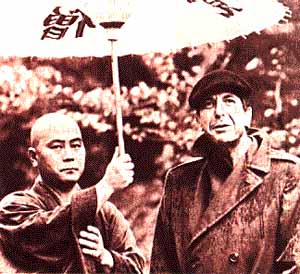
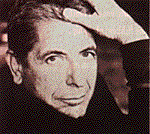
|
"The Marines of the spiritual world," Cohen has said of the Zen monks with whom he studies.
|
|
Poet, rock star, or Zen monk?
While Carson is keeping a low profile, few Canadian poets can claim the visibility wielded by Montreal-born poet and troubadour, Leonard Cohen. Cohen's notoriety is due largely to his dark, seductive folk and rock music - the setting for much of his brooding romantic verse - more than books of poems. He has been dubbed "the Poet-Laureate of Pessimism" and "the Prince of Bummers," and one critic has quipped of the Cohen oeuvre, "music to commit suicide to." Cohen, 63, can infuriate and entice, has a reputation as a lover of women that can cause women young and old to snort with disdain or laughter, or deliquesce with lust. More than once he has claimed he started writing to get dates. He's been linked to many women, some famous - singers Joni Mitchell and Janis Joplin, actress Rebecca De Mornay - some unknown, but immortalized in his songs and poems (So Long, Marianne, Suzanne, Sisters of Mercy).
Despite the lothario image, Cohen has maintained good relationships with the women of his past. His ex-wife and mother of two children, Suzanne Elrod - no, not that Suzanne - has described him as "the most responsible human being imaginable." He provokes and moves us with words that are not exactly run of the mill pop lyrics: "And I'll dance with you in Vienna / I'll be wearing a river's disguise / The hyacinth wild on my shoulder / My mouth on the dew of your thighs / And I'll bury my soul in a scrapbook / With the photographs there, and the moss / And I'll yield to the flood of your beauty / My cheap violin and my cross." Poetry and music are not separate for Cohen, who has said, "Some were songs first and some were poems first and some were situations. All of my writing has guitars behind it, even the novels."
At McGill, Cohen was a protégé of well-known poet and professor, Louis Dudek, who along with Irving Layton - the most important of Cohen's mentors - founded Contact Press in the fifties to help establish Canadian poets. Cohen's first book, Let Us Compare Mythologies, was published in 1956, and subsequent works like The Spice-Box of Earth and the novel Beautiful Losers drew critical acclaim.
Still, while accolades will feed the poet's ego for a while, a tiny larder is another story. Early on, Cohen found himself confronted with the age-old poet's dilemma: where's the money going to come from? According to UBC professor Ira Nadel's biography, Various Positions, in 1966 Cohen set upon a solution that could satisfy practical and artistic needs. Already a relatively accomplished guitarist, Cohen became enamoured of the songs of Bob Dylan. He announced at a party that included F.R. Scott, Al Purdy, A.J.M. Smith, Ralph Gustafson, Dudek, and Layton, that he would become the Canadian Dylan, and was soon transfigured into the poet-minstrel we know now. The Songs of Leonard Cohen followed in 1968 and Cohen the sensuous, mystical poet was now Cohen the sensuous, mystical folk rock singer.
Over the years, roaming from Greece back to Montreal and on to California, Cohen has issued a not-so-steady stream of records and books. The fact that the Los Angeles-based poet-songwriter now divides his time between music, writing, and training at a Zen monastery will do nothing to dispel the mythologies that surround his name. At the Mount Baldy Zen mon-astery, Cohen lives in a small cabin, serving in part as cook for the Roshi there, Joshu Sasaki, the 89-year-old Zen mas-ter who has trained him in spiritual discipline. Cohen has been or-dained as a Zen Bud-dhist monk, taking the name of Jikan: typical of Zen humour and mystery, it translates ironically as Silent One. "The Marines of the spiritual world," he has said of the monks and their training. And while he is perhaps known these days more for his records, his 1993 book Stranger Music: Selected Poems and Songs sold 40,000 copies in Canada, more than any Canadian poet, with the possible exceptions of Layton and Margaret Atwood, could hope to sell.
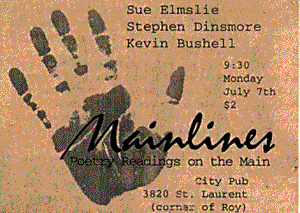
Photos: Patrick McDonagh
It is nothing,
not a wandering from his wife, not
any message, just
the way people who are loved can flay themselves open
and then close. His wife
licks roe from her lips, plans
to be pregnant by June. There is enough biting
wasabi for everyone, there are enough petals
of pickled ginger, enough sauce bowls, enough sauce, everything
is in order as the loose fish in the fishbowl of my hips
flips itself. And though its fins flutter,
the blade of the hot wine down my throat is so sharp,
that slice takes only a moment.
- Masarah VanEyck, from "Fish"
 Student poets: Dean Irvine, Masarah VanEyck, Marta Cooper, and Susan Elmslie Student poets: Dean Irvine, Masarah VanEyck, Marta Cooper, and Susan Elmslie
|
Mainlining the Muse
A hot summer evening on Blvd. St-Laurent - more famously known as The Main - and the poets are out in force. At the Pub Cité, Mainlines, a poetry reading series that has grown out of a student workshop sponsored by English department professor Brian Trehearne, BA'79, MA'81, PhD'86, is half-way through its first summer season. The small pub is packed with almost 50 poetry-hounds, an exceptional crowd. Beer is flowing; cigarettes are smoldering. On the stage, a woman in her mid-twenties, poised but a tad bashful, reads to the crowd from a sheaf of foolscap. The crowd is attentive and supportive. According to Marta Cooper, 23, BA'97, who co-organizes Mainlines with McGill doctoral student Dean Irvine, most of the audience are fellow writers or friends.
Susan Elmslie, 29, is reading her work. A doctoral student in English, Elmslie has already published a chapbook, When Your Body Takes to Trembling, with Windsor's Cranberry Tree Press. Her interest in poetry has deep roots. "I started writing when I was about 10," she says. "The first poet I recall reading was Leonard Cohen - Flowers for Hitler. Reading poetry felt like I was doing something naughty."
Masarah VanEyck, 27, a history doctoral student from Minnesota, is also a published poet and won a poetry contest sponsored by the literary journal Other Voices. Like Elmslie, she began writing in childhood. But both Elmslie and VanEyck insist that poetry requires experience. "It takes a long time to decide who you are," VanEyck points out.
Both also reject the stereotypes. "I resist the romanticized notion of a poet," says Elmslie. "It's limiting. It says that unless you can strip morals away, live at the edge of society, you're not giving yourself to art." Indeed, anyone who is working on a doctoral dissertation cannot pretend to live solely for art. Says VanEyck, "It's best to have preoccupations other than writing, to keep the writing peripheral. I try to be disciplined. I do homework - I still call it homework! - until around 11:30 p.m., when I crack a beer and write for an hour or two."
The Mainlines poetry tends toward the personal and confessional, exploring ideas of family, love and relationships, and trying to situate the narrator in the world around her. But although broad themes are shared, individual approaches vary. VanEyck's poems are confessional, often erotic, filled with images of the body, eating, starving, swelling, transforming. Cooper's more narrative-driven poems focus on family history and troubled lovers. Many of Elmslie's introspective meditations read as conversations between poet and lover, poet and friend, as the narrator tries to sort through emotions and memories.
Cooper says there is a strong community feeling in the student poetry scene, and she credits Trehearne and his workshop. Last year's workshop prompted McGill's first undergraduate poetry writing course open to 20 students. Talented students are recognized by the the Mona Adil-man Poetry Prize, a $650 award given for students writing with an ecological bent. Mona Adilman, BA'45, a poet, social activist, and environmentalist wanted young poets to be encouraged in their craft. Recent winners include Portia Taylor, BA'97, (1997), Aidan Baker, BA'96, (1996), and Robyn Eversole, MA'95, (1995).
Liars, bad drivers, insufferable blabbermouths
So continues the McGill tradition of the poet, a complex figure in the end, dispelling myths with the right hand, propagating them with the left. Plato distrusted the poets so much he would have banned them from his Republic, there being no place in such an ideal world for liars and seducers, storytellers and social critics. Yet what would Plato have done with F.R. Scott, the former Dean of Law at McGill, Anne Carson, professor of Classics, Eric Ormsby, expert in Islamic studies? (We know what he'd want to do with the likes of Irving Layton and Leonard Cohen; our money would be on Layton, who, with enthusiastic help from Al Purdy, would probably wrestle the philosopher to the ground for a good pummeling, rebuking him all the while - as he has done with fellow poets - as an "insufferable blabbermouth.")
The poets of today can't be pigeon-holed as those dreamy-eyed romantics of yore, nor in this ironic, postmodern age as the bellowing, bardic visionaries drinking themselves to death. British novelist Martin Amis jokes in The Information that poets should not be granted driver's licenses, unable as they are to negotiate the linear, narrative-like gridway of modern roads. Perhaps, but the poets we see today at McGill, as elsewhere, are as varied and level-headed a bunch of artists as you're likely to meet, and any good republic could do with a lot more of them, doggedly interpreting the minutiae and the mysteries of the world for those sharp enough to listen.
|